
Gordon Rupert Dickson was a Canadian-American science fiction writer. He was inducted into the Science Fiction and Fantasy Hall of Fame in 2000.
Stanley Albert Schmidt is an American science fiction author and editor. Between 1978 and 2012 he served as editor of Analog Science Fiction and Fact magazine.

Analog's Children of the Future is the third in a series of anthologies of science fiction stories drawn from Analog magazine and edited by then-current Analog editor Stanley Schmidt. It was first published in paperback by Davis Publications and hardcover by The Dial Press in December 1982.

Ends is a collection of science fiction stories and poems by American writer Gordon R. Dickson. It was first published by Baen Books in 1988 and as a companion volume to Dickson's Beginnings. Most of the stories originally appeared in the magazines Analog Science Fiction and Fact, Astounding, If, Galaxy Science Fiction, Destinies, Science Fiction Stories and Amazing Stories The poems first appeared in The Final Encyclopedia.

Gordon R. Dickson's SF Best is a collection of science fiction stories by Gordon R. Dickson. It was first published by Dell in 1978 and was edited by James R. Frenkel. The stories originally appeared in the magazines Analog Science Fiction and Fact, Fantasy and Science Fiction, Satellite and If.
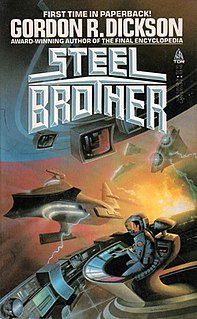
Steel Brother is a collection of science fiction stories by Gordon R. Dickson. It was first published by Tor Books in 1985 and reprints most of the stories from Dickson's 1984 collection Dickson!, with one substitution and one added interview. The stories originally appeared in the magazines SFWA Bulletin, Astounding, Galaxy Science Fiction, Analog Science Fiction and Fact, Ellery Queen's Mystery Magazine and Science Fiction Stories. The book contains the introduction to each story by Sandra Miesel from the previous collection, though they are not credited.

The Last Dream is a collection of fantasy and science fiction stories by American writer Gordon R. Dickson. It was first published by Baen Books in 1986. Most of the stories originally appeared in the magazines Fantasy and Science Fiction, Analog Science Fiction and Fact, Fantastic, Startling Stories and Worlds of Fantasy.
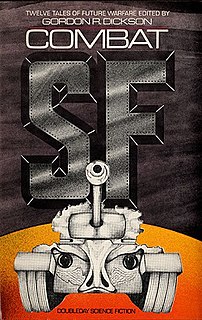
Combat SF is an anthology of science fiction stories edited by Gordon R. Dickson. It was first published by Doubleday in 1975. Most of the stories originally appeared in the magazines Analog Science Fiction and Fact, Galaxy Science Fiction, Fantastic Universe, New Worlds, Fantasy and Science Fiction, If and Planet Stories.

Nebula Winners Twelve is an anthology of science fiction short stories edited by Gordon R. Dickson. It was first published in hardcover by Harper & Row in February 1978, and reprinted in December of the same year. A paperback edition followed from Bantam Books in April 1979.

Analog Science Fiction and Fact is an American science fiction magazine published under various titles since 1930. Originally titled Astounding Stories of Super-Science, the first issue was dated January 1930, published by William Clayton, and edited by Harry Bates. Clayton went bankrupt in 1933 and the magazine was sold to Street & Smith. The new editor was F. Orlin Tremaine, who soon made Astounding the leading magazine in the nascent pulp science fiction field, publishing well-regarded stories such as Jack Williamson's Legion of Space and John W. Campbell's "Twilight". At the end of 1937, Campbell took over editorial duties under Tremaine's supervision, and the following year Tremaine was let go, giving Campbell more independence. Over the next few years Campbell published many stories that became classics in the field, including Isaac Asimov's Foundation series, A. E. van Vogt's Slan, and several novels and stories by Robert A. Heinlein. The period beginning with Campbell's editorship is often referred to as the Golden Age of Science Fiction.

The Many Worlds of Poul Anderson is a collection of science fiction short stories by American writer Poul Anderson, edited by Roger Elwood, first published in hardcover by Chilton in June 1974. A paperback edition retitled The Book of Poul Anderson followed from DAW Books in June 1975, and was reprinted in June 1978, December 1978, and October 1983. Most of the pieces were originally published between 1947 and 1971 in the magazines Astounding Science Fiction, The Magazine of Fantasy and Science Fiction, Analog, Riverside Quarterly, and Other Worlds Science Stories. The others are original to the collection.

Nebula Award Stories 1965 is an anthology of science fiction short works edited by Damon Knight. It was first published in hardcover by Doubleday in 1966, with a Science Fiction Book Club edition following in October of the same year. The first British edition was published by Gollancz in 1967. Paperback editions followed from Pocket Books in the U.S. in November 1967, and New English Library in the U.K. in April 1969. The U.K. and paperback editions bore the variant title Nebula Award Stories 1. The book was more recently reissued by Stealth Press in hardcover in February 2001. It has also been published in German.

The Analog Anthology #1 is an anthology of science fiction stories and articles drawn from Analog magazine over its first fifty years of publication, edited by then-current Analog editor Stanley Schmidt. It was first published in paperback by Davis Publications in December 1980, and reprinted under the alternate title Fifty Years of the Best Science Fiction from Analog in 1982. A hardcover edition was issued under the alternate title Analog’s Golden Anniversary Anthology in 1981.
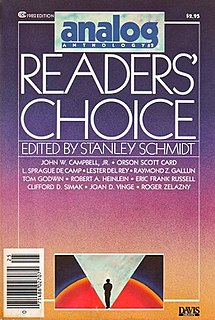
The Analog Anthology #2: Readers' Choice is an anthology of science fiction stories and articles drawn from Analog magazine, edited by then-current Analog editor Stanley Schmidt. It was first published in paperback by Davis Publications in January 1982, and reprinted later the same year under the alternate title Analog: Readers' Choice. A hardcover edition was issued by The Dial Press under the alternate title in March 1982.
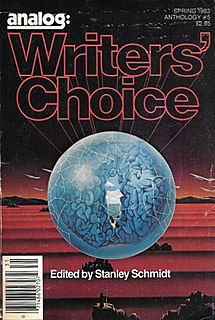
Analog: Writers' Choice is the fifth in a series of anthologies of science fiction stories drawn from Analog magazine and edited by then-current Analog editor Stanley Schmidt. It was first published in paperback by Davis Publications and hardcover by The Dial Press in 1983.
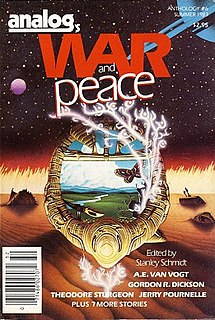
Analog's War and Peace is the sixth in a series of anthologies of science fiction stories drawn from Analog magazine and edited by then-current Analog editor Stanley Schmidt. It was first published in paperback by Davis Publications and hardcover by The Dial Press in June 1983. The hardcover edition bore the alternate title War and Peace: Possible Futures from Analog.
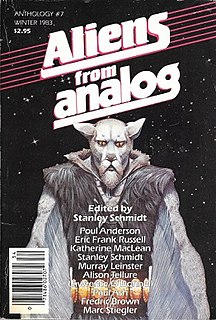
Aliens from Analog is the seventh in a series of anthologies of science fiction stories drawn from Analog magazine and edited by then-current Analog editor Stanley Schmidt. It was first published in paperback by Davis Publications and hardcover by The Dial Press in 1983.
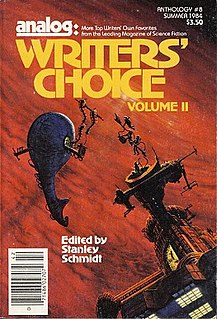
Analog: Writers' Choice, Volume II is the eighth in a series of anthologies of science fiction stories drawn from Analog magazine and edited by then-current Analog editor Stanley Schmidt. It was first published in paperback by Davis Publications and hardcover by The Dial Press in 1984.

Analog's From Mind to Mind: Tales of Communication is the ninth in a series of anthologies of science fiction stories drawn from Analog magazine and edited by then-current Analog editor Stanley Schmidt. It was first published in paperback by Davis Publications in November 1984, with a hardcover edition following from The Dial Press in December 1984 under the alternate title From Mind to Mind: Tales of Communication from Analog.

Analog's Expanding Universe is the tenth in a series of anthologies of science fiction stories drawn from Analog magazine and edited by then-current Analog editor Stanley Schmidt. It was first published in hardcover by Davis Publications for Longmeadow Press in 1986.


















